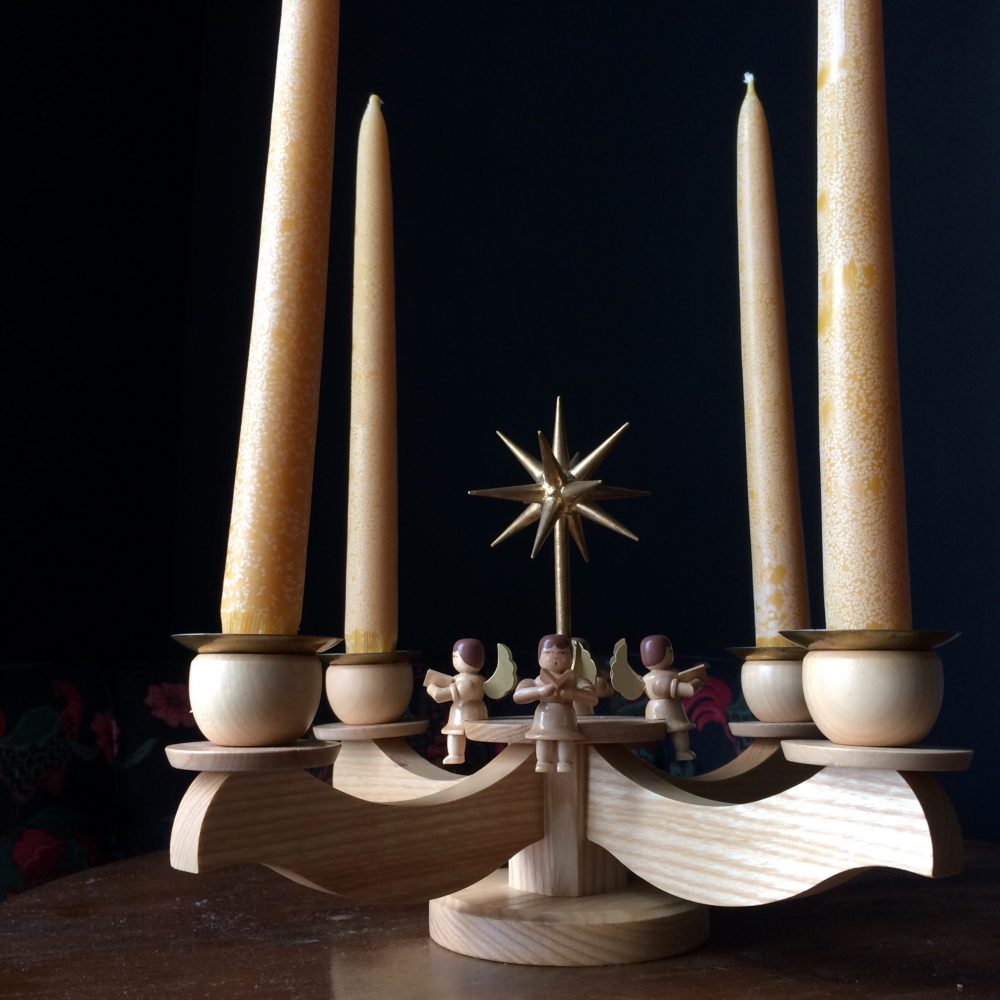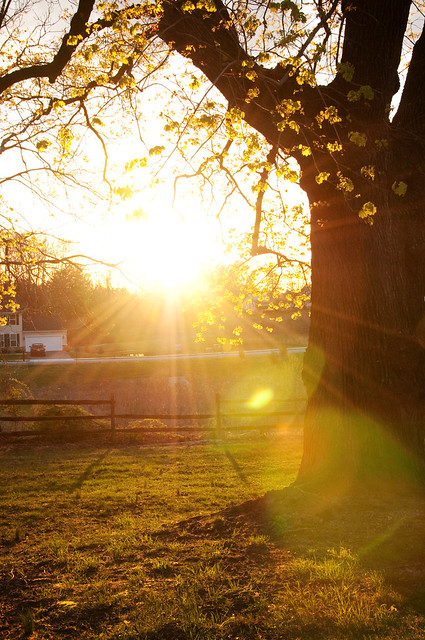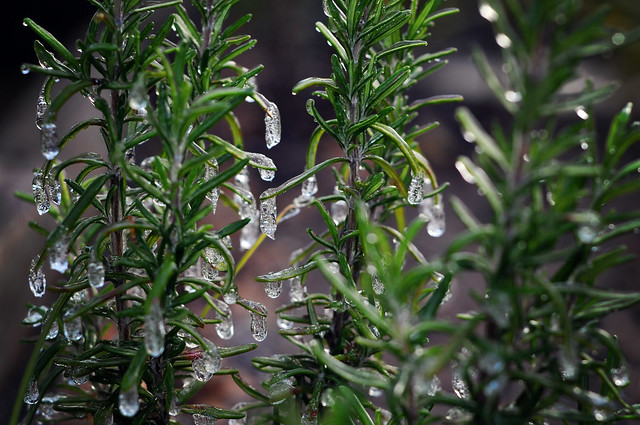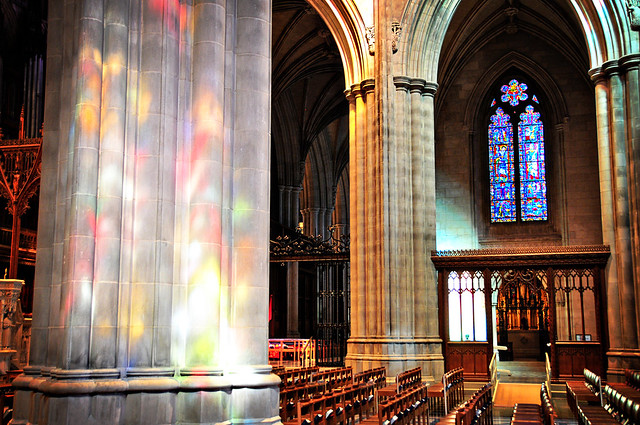
by Christie Purifoy | Feb 13, 2018 | children, Church, Easter, Family, grief, Lent, motherhood, Seasons, Spring, Uncategorized

On school “Career Day,” she sat at the back of the third-grade classroom. Her bright face was framed by two glittery barrettes. “What’s the funniest things you’ve ever written?” she asked.
“The funniest?” I said. Quiet settled around us like a fog, filling up one second, then another.
“To be honest, I tend to write about sad things. Those are the things that snag in my heart and make me want to understand them. I guess I write about sad things because sad things happen to all of us.”
She sat up straight in her desk and almost shouted, “My cat died!” She looked toward a corner of the room and then back into my eyes. No longer shouting, she said, “My grandmother died, too.”
***
On Valentine’s Day, our youngest will give her preschool friends paper cards covered in glitter glue and sparkly stickers. Her bedroom floor has become a Milky Way of pink and purple dust.
Valentine’s Day is also Ash Wednesday. That afternoon, Jonathan and I will gather four children and drive to church. “Dust to dust” and a cross of ashes on all our foreheads. Pizza dinner with our church family. Heart candies in pastel shades pulled from linty pockets.
Last year, I was not prepared for the terrible sight of a black cross on my little girl’s tiny, white forehead.
No, your heart says.
Yes, your mind insists.
This year, I am prepared. I know I will want to wipe it off. I will want to say to her, I’m sorry. But I will not.
Five years ago, she was born into this breathing world, and it is too late for apologies.
You are dust, Elsa Spring.
And so am I.
***
Christmas at Maplehurst was the glitter of snowfall. Epiphany was the sparkle of ice on the dark water of the neighborhood retention ponds. With my sister and her children, we feasted. We skated. We laughed, and though we did not talk about it, I know we also remembered.
Only two years ago, my nieces and nephews celebrated Christmas with their Dad in the house with the mango tree. Only two years ago, I celebrated Christmas with my parents, their grandparents. “We’ll slow down,” they said. “Maybe we’ll travel!” they said. We didn’t know we were all walking nearer to the edge of a cliff.
Each Christmastime, I find myself bracing for bad news. “What’s coming?” my body asks. “Nothing,” my mind says. “You’re only remembering.”
“Sorrow is always coming,” my heart insists.
***
The sparkle of Epiphany has been washed away by rain. There is no snow at Maplehurst, and the ice over the dark water is thin and broken. Now there is only fog.
“This is bad,” Jonathan says, driving our car toward church on Sunday morning.
“Ice would be worse,” I say. I mean it to be comforting, but the words slip away, and we are both quiet peering ahead along a road we can no longer see.
I turn toward my sons seated at the back of the minivan. “Remember, you may notice some of our friends at church crying. We are sad right now, and it’s okay to be sad. Do you have any questions?”
They have no questions.
Or maybe they do. Maybe it is only that they know by now their parents do not have the answers. At least, not the easy ones they may want.
These past two years, grief has visited family and grief has visited friend after friend, and though these four children are mine to care for, I cannot protect them from sorrow. I cannot pretend this world is different than it is.
If they must know sorrow, I pray, let them know comfort, too.
***
I’ve always imagined Lent as a season of subtraction. We do without. We live with less.
But the word itself is an old word for spring, and spring is a season of more. In spring, there is a very little bit more every day—more light and more life, as if joy were a buried seed and this is our one chance to watch it take root and grow.
Lent is related to lengthen, and this is the season of lengthening days.
I tried to explain all this to my kids at dinner, but I failed. Shrove Tuesday they love. “Let’s eat all the pancakes in the world!” Elsa said. But Lent? No, thank you. Though my boys were less polite than that.
Maybe that’s why I kicked them out of the room halfway through our post-dinner reading of C. S. Lewis’s Prince Caspian. They disrupted our family reading with laughter instead of their usual bickering, but that somehow made it worse. As if anything were more fun than listening to Mom read about lions and dancing trees.
Still, I wish they’d been there. I wish we could have talked about the turning point in this story, and how it all began when Lucy recognized her failure and stopped trying to defend herself. “I’m sorry, Aslan. I’m ready now,“ she said.
“Now you are a lioness,” said Aslan. “And now all Narnia will be renewed. But come. We have no time to lose.”
***
Come! We have no time to lose.
Time is flowing on, but time is also moving backwards. This is the meaning of renewal.
Renewal is spring made visible, but it is also winter undone. The tangled threads of the past are set right. Our mistakes are rewoven. Even the power of death itself has begun to be unraveled.
And we can participate.
Is not this the kind of fasting I have chosen: to loose the chains of injustice and untie the cords of the yoke … (Isaiah 58:6).
No doubt, I will long for some shortcut. No doubt, I will want to guide my children toward some other path. I will wish for them some easier way unmarked by grief or hunger or unanswered questions.
I will want to keep them comfortable, but comfort isn’t always our friend. Still, I think I’ll keep a few of those leftover candy hearts in my pocket. A little sweetness to share along the way.
***
What will we see when the fog rolls back and we arrive at Easter morning?
Perhaps not sunrise. Perhaps we must still wait for that. But even though we go on walking in the valley of the shadow, the sky above is pierced with starlight.
Look at that! we’ll say to one another. This night is more like noonday (Isaiah 58:10).
Then we will turn to our companions on the way, shining with so much reflected light, and we will say to one another: Remember that you are stardust, remember you are on your way home.

by Christie Purifoy | Mar 6, 2017 | Art, Church, Gardening, Home, Homebound, Lent, Seasons, Spring, Uncategorized, Waiting
Elizabeth and I are homebound. She, a writer of poetry and prose, is bound to Mersea, a 1904 white Victorian nestled in the historic district of a South Carolina shrimping village. I am bound to Maplehurst, a red-brick farmhouse built by Pennsylvania Quakers in 1880. We are both writers, wives, and mothers, but nearly twenty years and hundreds of miles lie between us. This season, as winter turns toward spring and Lent leans toward Easter, Elizabeth and I are writing letters, she beneath the pines and pecans, I beneath the hemlocks and maples. We will reflect together on our homebound journeys. We will explore the bonds of love and faithfulness that tie us, and not always easily, to these particular places and to the people sheltered within them. Please join us for an epistolary exploration of love, loss, and restoration.

Read Elizabeth’s letter of March 3 here. My response is below.
March 6, 2017
In my third-floor office, tucked up in an armchair near the window
Dear Elizabeth,
You write of pansies and roses and blooming cherry trees, and I imagine a scented floral carpet working its way across our country, south to north. I know a new season is on its way, but it is difficult to believe in spring while this bitter wind whips across my attic window. The temperature here at Maplehurst is predicted to fall to thirteen tonight. I am afraid that the swollen buds on my peach and apricot trees will not survive to bloom. Seasons do collide, as you say, and there are casualties. I am grieving the fruit we likely will not pick this July.
To invest in a garden is to have your heart broken on a regular basis. The more you pour in, the more you receive, but the more you also have to lose. In the past year or two, I have focused my gardening efforts on “extending the season of interest,” as it says in one of my gardening books. This means planting the earliest blooming snowdrops and daffodils and the latest flowering dahlias and windflowers. This week has shown me that in addition to the great joy of more flowers I now also have an extended season for potential heartbreak. My early “February Gold” daffodils were a lovely winter surprise, but now they look, from my window, like a child’s toys left out to be ruined in the weather. I should have gathered them all up, but I couldn’t bear to erase every last bit of golden yellow from beneath the hawthorn trees.
I had forgotten how slow the shift from winter to spring can be (two steps forward, one step back). Home restoration is the same. I sometimes think that every project we complete merely highlights the decay that remains in new ways. If I paint a wall, the ceiling suddenly looks dingy. If I paint one radiator, the peeling paint on the others stands out more than ever. I recently painted the trim down our back stairs, but now the cracks in the plaster wall are all I can see (two steps forward, one step back). If I struggle to know where to begin, I also struggle to decide when, and where, to stop.
You write that the slow process of transformation shapes you, that it is formative. I agree, and yet I resent the slowness. If I could, I would snap my fingers – ta da! – and Maplehurst would be fixed, repaired, spruced up. This place, and everyone in it, would be healed. Made whole. But if I lost the process, what else would I lose? I know I would lose a great deal, though I am loathe to admit it.
Lent is indeed a sacred time. It is a season for active waiting. It is the season when I try to turn, deliberately, toward the source, like a daffodil turning its face toward the sun.
…
I set this letter aside when it came time to make dinner. Now a night and a day have passed. The cold did come. The daffodils no longer look like toys, but like debris that has been trampled underfoot. They are utterly wilted.
The bitter cold arrived with the first Sunday of Lent. In the morning, I read the Sunday paper and shook my head. I could not finish a single story because every one was breaking my heart. At church, we began our service, as we do every year during Lent, with a recitation of the ten commandments and a prayer of confession.
Now I recall what it is I hear when you say the name of your home Mersea.
Mercy. I hear mercy.
It is both prayer (Lord, have mercy) and statement (Lord, you are merciful indeed).
with love,
Christie
Maplehurst


by Christie Purifoy | Nov 28, 2016 | Advent, children, Christmas, Church, Family, God's promises, Jesus, Joy, Uncategorized, Waiting
This year, the women’s ministry at my Pennsylvania church published an Advent devotional with written reflections from twenty-nine of our parish women. I was honored to write a reflection for the first Sunday of Advent, and I am so glad to be able to share it here, too.
The following piece appears in Behold, God’s Promises, an Advent devotional from the Church of the Good Samaritan in Paoli, PA. You can download the entire devotional for free here.
Scripture readings for the First Sunday of Advent are from the Daily Office (Year 1) in the Book of Common Prayer: Psalms 146, 147, Isaiah 1:1-9, 2 Peter 3:1-10, Matt. 25:1-13

Peter told us the scoffers would come, but I never imagined they would speak with the voices of my own children.
On the first Sunday of Advent, the six of us gather at the dining room table where our Advent wreath lies ready for us.
My younger son grips the candle snuffer and asks, “Why do we do this every year?”
“To remember Jesus came and will come back again,” I tell him.
“What’s taking so long?!” he says.
His older brother and older sister chime in, “It’s been thousands of years!” Their baby sister echoes, “Thousands!”
My children, like those scoffers Peter warned against, believe “everything goes on as it has since the beginning of creation.” Day follows day like a soothing lullaby until we, like virgins waiting with our lamps, drift complacently to sleep.
Even my oldest child cannot remember a day beyond twelve years ago, and yet how confident they are life will go on always the same.
I look at their faces and remember well those years when there were no children in my home. I cried for children and prayed for children and witnessed four times the power of God to change everything. Like Mary before me, I sing, “… the Mighty One has done great things for me” (Luke 1:49).
In a moment the world is changed utterly.
In a moment our ordinary is shattered by joy.
If a voice in our culture, or our home, or even our own heart says, “Where is this ‘coming’ he promised?” do not listen and despair. With every turning of this planet, with every setting of the sun, with every swish of the calendar page, we are nearer.
This Advent season we are nearer.
Keep watch.
Prayer: Dear Father, wake us for this Advent journey. You, our bridegroom, have been a long time in coming, and we do grow weary. Remind us of your nearness and impress on our hearts the reality of your return. Make us ready to welcome you. Amen.
by Christie Purifoy | Jun 5, 2014 | Church, Community, Florida, God's promises, Pregnancy, Uncategorized, Waiting
I wrote a version of this post almost exactly two years ago. In early June of 2012, I had been wandering in a Florida wilderness for two years. I was tired of waiting. Tired of rootless living. I was six months pregnant and desperate to leave Florida. I wanted my baby girl to be born wherever home might be. But I had no idea where home might be.
Six weeks after our arrival in Pennsylvania, Elsa Spring was born. Today, that baby girl is rounding the curve on two years old. And we have come home. Every day I breathe “thank you.”
But it is Pentecost again, and I have realized something. We are lost and we are found, we are lost and we are found again, but we never truly leave this song behind. This beautiful ache of a song.
***
Pentecost Sunday is approaching, and I feel stuck in that room. Waiting. Asking this question: how did they survive the long, empty days between Jesus leaving and the Comforter coming?
How did they endure being lifted up by the joy of a promise believed only to drop again into the discouragement of yet another not yet?
And why the gap? Why did they have to wait at all?
We do know that the wait moved them to gather together. I imagine the promise was easier to believe when they could see the hope in one another’s faces. When they could pass around their Jesus stories, like a platter of bread and fish. Stories multiplied into hope. And faith.
And I imagine they worshipped. Sang and prayed.
Was this what it was all for? Was their worship the reason?
Did God wait, strain with holding himself back, because he wanted to hear their songs?
“Call to me,” he had once told them. “And I will answer you and tell you great and unsearchable things you do not know” (Jeremiah 33:3).
Call. My husband tells me this word suggests something organized, something formal. Something created. Like a song. Like a poem. Something more than careless words tossed at the sky.
Maybe you don’t sing songs. Maybe you don’t write poems. But maybe you journal. Maybe you sketch. Maybe you take photographs or bake bread for the neighbors. Maybe you orchestrate elaborate finger-painted messes with the three-year-olds at church and maybe, just maybe, that is a call? A song? A cry of longing for more of God?
And maybe that is the point of it all. The point of waiting. The point of living. To add our call to the many others until a crescendo of sound and beauty and worship rises to heaven and all is unleashed.
Then, just as it was that Pentecost when God’s church was born, wind and fire reveal the great unknowns.
What have we all been waiting for? To hear the mysteries of God’s glory in a language we can comprehend.
Those unsearchable glories we never even knew to seek.

by Christie Purifoy | Dec 10, 2013 | Advent, Church, Home, Jesus, Stories, Uncategorized, Waiting
On the first day of Advent, our church sanctuary was draped in evergreen.
Bare evergreen.
There were no shiny ornaments. There were no red or green ribbons. I looked at those unembellished greens and heard them say, “Not yet. Not yet.”
Our home looks much the same. Undecorated, except for the white pumpkin still sitting on the front steps.
It wasn’t intentional. Thanksgiving turned so quickly to Advent, all in a rush of visiting friends and family, that I couldn’t quite keep up. I found the advent wreath in the basement. The boys circled it with greenery. And that was all.
*

*
The world outside our walls has thrown on the glitz and made room for the glitter and every other year I have been right there keeping time with that fast Christmas beat.
Not this year. Not yet.
For more than a week, I’ve sat with bare branches, four candles, and a pile of Christmas books. Every other year I have rushed to fill in the gaps, to embellish the plain, and to pile on more. This year the Advent cry Come, Lord Jesus, Come has echoed in bare corners and across empty tabletops.
And I have heard something in those echoes. Something that frightens me.
I have heard as if for the first time the story of how God came and his own did not recognize him. Of how he appeared in a story crowded with a greedy empire, an oppressed people, and long-whispered promises of deliverance and restoration. A good story. A true story. And yet …
Living within the density of their story, God’s own people were unprepared for the ways in which God himself would turn the story inside out and upside down. They were unprepared to meet the Truth face to face.
And this is what I have heard echoing in the empty spaces of my house: who am I waiting for? Will I know him when he comes?
*
Year after year, I have rushed to fill the empty space of my fireplace with stockings. I have moved quickly to cover bare branches with ornaments. I have penciled in the calendar; I have filled the closet with gifts.
Year after year, I have greeted the Christmas season with everything I already know and all that I have figured out. I have said Come, Lord Jesus, Come to a face I find comfortingly familiar. A face with no more power to shock.
This year should have been the same, but a severe mercy and a difficult grace intended differently.
Without meaning to, I have decked these halls with empty space.
My prayer today remains the same. Come, Lord Jesus, Come. But this time, emptiness has made way for echoes. Bare corners have left room for the unknown and unseen.
And I prepare to have my world turned upside down by the King whose name I call.
Come, Lord Jesus, Come.
by Christie Purifoy | Feb 12, 2013 | Church, Community, Faith, God, Home, Religion, rest, Uncategorized
We married young and hit the road. All we wanted was Texas dust in the rearview mirror. The rumble of the El was our siren song.
We weren’t afraid because we carried this around like a turtle shell: Church.
//

//
Baptist, Catholic, Greek Orthodox, Church of Christ … ours was a messy family stew that had finally deposited us both in a non-denominational box.
The box was what we knew. The box felt safe.
But boxes, it turns out, don’t travel well, and we were wanderers now. D.C., Chicago, Jacksonville, now this little country corner of the Philadelphia burbs.
Church has been a constant, but it’s been anything but safe. Anything but predictable. Not really a turtle shell, after all.
We thought there was one right way to do church. One right way to be the church. The way we were raised, of course.
But God kept us moving, and he kept our ideas about church moving, too. What had been small and safe became big and wild. Beautiful but unpredictable.
//

//
I’ve been thinking about those first Christians. They were “scattered” by persection, made wanderers for God’s own purposes. They wandered, and the church grew.
As we wandered, our understanding of church grew, too. Always bigger, always better than we knew.
//
I’ve sat in a Catholic mass and realized that the Eucharist might be more than the sum of its parts. Much more than the saltines and grape juice of my childhood.
I’ve stood in a gathering of Vineyard women when the doors of our meeting-place burst open with a loud wind. I watched that wind sweep around the room but I knew those doors didn’t open to the outside. What I saw and felt was no earthly wind but Pentacost miracle.
I’ve sat in an Easter morning service when the procession of colorful vestments and golden cross was so beautiful, so celebratory, I could have wept.
I once sat in an old wooden pew. A choir lifted its voice, and I suddenly knew what heaven sounds like.
I’ve seen adults baptized in Lake Michigan.
I’ve seen babies baptized with a cupful of water.
All of it so good.
//

//
Recently, we’ve taken to driving a long, long way to get to church. It’s something I’ve always said I’d never do. Join the imperfect neighborhood church, don’t go chasing “perfect” miles away. Perfect doesn’t exist.
But I don’t think I’m chasing perfect. I think I’m searching for home. The place where this wanderer can find rest.
Maybe this will be my church for a season. Maybe for a long, long time. Only my second Sunday there, and I was fretting about it instead of worshipping. I could hardly hear the music because I was listening to thoughts like these: Is this the place? Are we right to come so far? Will we make friends here? Or wil we set off searching, again?
The music finally broke through, and I realized what we were singing: Better is one day in your courts than thousands elsewhere.
I have been given so much more than one day. I’ve been given a lifetime of Sundays. A lifetime of small groups and youth groups. Of church retreats and coffee hours.
//
We pile the kids in the car and drive and drive. We do it because we need that soft brown bread. We need that sweet red wine.
We do it because one day in His courts really is that good.












